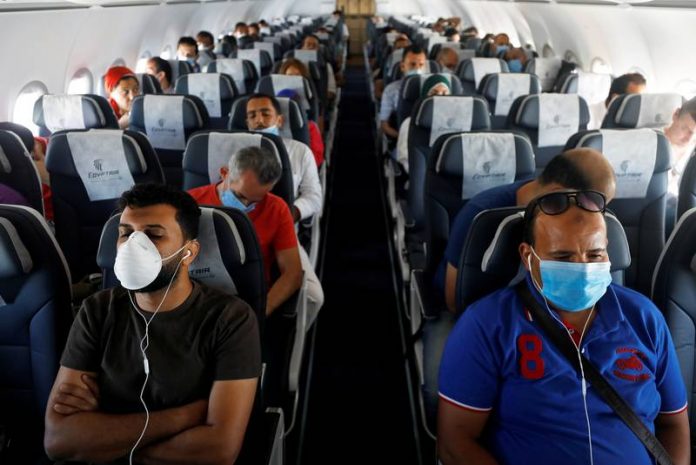A campaign by coronavirus-stricken aviation giants to persuade the world it’s safe to fly has been questioned by one of the scientists whose research it draws upon.
Dr. David Freedman, a U.S. infectious diseases specialist, said he declined to take part in a recent presentation by global airline body IATA with planemakers Airbus, Boeing and Embraer that cited his work.
While he welcomed some industry findings as “encouraging,” Freedman said a key assertion about the improbability of catching COVID-19 on planes was based on “bad math.”
Airlines and planemakers are anxious to restart international travel, even as a second wave of infections and restrictions take hold in many countries.
The Oct. 8 media presentation listed in-flight infections reported in scientific studies or by IATA airlines — and compared the tally with total passenger journeys this year.
“With only 44 identified potential cases of flight-related transmission among 1.2 billion travelers, that’s one case for every 27 million,” IATA medical adviser Dr. David Powell said in a news release, echoed in comments during the event.
IATA said its findings “align with the low numbers reported in a recently published peer-reviewed study by Freedman and Wilder-Smith.”
But Freedman, who co-authored the paper in the Journal of Travel Medicine with Dr. Annelies Wilder-Smith of the London School of Hygiene and Tropical Medicine, said he took issue with IATA’s risk calculation because the reported count bore no direct relation to the unknown real number of infections.
“They wanted me at that press conference to present the stuff, but honestly I objected to the title they had put on it,” the University of Alabama academic told Reuters.
“It was bad math. 1.2 billion passengers during 2020 is not a fair denominator because hardly anybody was tested. How do you know how many people really got infected?” he said. “The absence of evidence is not evidence of absence.”
IATA believes its calculation remains a “relevant and credible” sign of low risk, a spokesman said in response to requests for comment from the industry body and its top medic Powell.
“We’ve not claimed it’s a definitive and absolute number.”
































